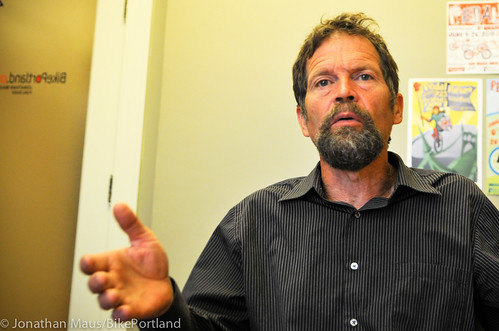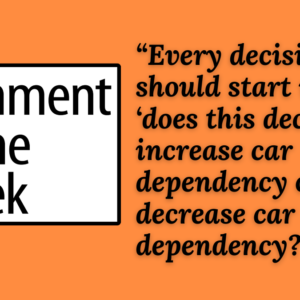If your city proudly proclaims its Bicycle Friendly Community designation, you might want to re-read your application and make sure you didn’t exaggerate. That’s because Steve Clark, the new staffer in charge of the program for the League of American Bicyclists, is on a three-year, 300 city tour to find out if they live up to the hype.
“People will sometimes embellish things… These visits are a way to ground-truth what the applications are saying.”
— Steve Clark
Portland was Clark’s 49th stop on the current tour. From here he headed north to Seattle. He’ll visit 100 cities over the next three years thanks to a funding partnership with Trek Bicycle Corporation. He stopped into our office last week.
“People will sometimes embellish things,” Clark shared, “These visits are a way to ground-truth what the applications are saying.”
The League’s Bicycle Friendly Community (BFC) program — the one that designates cities as Bronze, Silver, Gold, or Platinum — started in 2003. Clark estimates they’ve gotten about 741 applications since then and have awarded just over 300 cities. The process to become a BFC is pretty straightforward: City staff submit an application detailing everything they do for bikes and the League uses a combination of a numbered scoring system, a panel of local reviewers, and an internal advisory board to make the decisions.
Having the manager of the program leave League headquarters in D.C. and visit the cities to get first-hand intel on bikeways and local bike culture is new, and Clark seems like the right person for the job. He founded the Minnesota Coalition of Bicyclists (now the Bicycle Alliance of Minnesota) in the early 1980s, then was the bike coordinator for the City of Boulder, Colorado. Then, after a consulting stint, he was program manager for Transit for Livable Communities, the Minneapolis-based non-profit that implemented the region’s participation in the federal Non-motorized Transportation Pilot Project.
Clark started his current tour in January and has so far visited Arizona, Texas, and California.
During his visit last week we discussed complacency, the League’s new Diamond rating, how Portland is faring, the importance of political champions, and more…
Advertisement
A big issue is land-use. We’ve created so many communities since World War II around the needs of the automobile. We’ve got so many wide lanes and roads and things are so spread out.
“And you can’t be afraid of opposition because without opposition you’re probably not doing anything. That’s your best barometer that you’re making a difference.”
To obtain Diamond we’re looking at models from northern Europe. I think it’s going to be a fairly high bar… The Diamond city will be closer to 20% mode share and if you look to Europe you see they’re much less afraid of making it more difficult to drive and making it easier to bike. They do as many short cuts [for bikes] as they can, they make auto parking expensive. In some cities you simply can’t get to the central city by car. We’re probably a long ways from having those kind of strategies in place.
Yes. I think there’s always that potential. We’ve heard from advocates who have felt like, ‘Well, this is great but now we’re hearing from our public works director, ‘Why are you guys complaining? We’re already gold or platinum.’ ‘ So we certainly don’t want to be the cause for complacency.
Yes. But I’d have to look that up and get back to you. (Turns out they have: Denver, Colorado and Rockville Maryland were downgraded, but were re-instated after a subsequent application process.)
Mountain bike trail access is considered in the evaluation but it hasn’t been a strong emphasis to me because my focus has been more on bicycles as transportation.
It could. But there are 100 questions on the evaluation and it ultimately means they might lose like 8 points out of a total of 600 — there are so many other things we’re looking at.
We’re also trying say that, with Platinum cities, we want them to be truly models. There shouldn’t be anything glaringly missing from a Platinum community… Like, if someone looked at Portland and said, ‘Well, they don’t have any mountain bike access.’ But we also don’t have anything in writing that says, ‘If you don’t have these specific components you’re not going to be Platinum.’
Mostly very positive. The fact that I could put my bike on the Amtrak bus without it being in a box. That was nice. Then I get here and I see that Google tells me to take Broadway, a busy arterial street, yet it has a nice bike lane. It worked perfectly. I went all the way [from Union Station] to the other side of the interstate. Then, coming into town again, pretty much all the major streets I wanted to use had bike facilities. Then, coming here on SW Stark on the big, green, wide, lane [which had, in an amazing coincidence, been re-painted that same day!]. So far, for a major city, Portland is the best I’ve seen. And I know people who live in Portland don’t want to hear that… But the reality is we have a long way to go in this country.
Every place has their own ebbs and flows with the politics. It really does depend on who’s at the top. You need the vision thing happening at the top. Take Salt Lake City Utah Mayor Ralph Becker. He’s a champion for bicycling that truly believes this is the way they’re going to become a world-class city. So he brings in a public works director and a bike coordinator that’s going to get the job done.
But who knows, two years from now, the mayor and those staffers might not be there. And that’s where a strong advocacy group comes in.
It’s really a three-legged stool. You have to have a strong advocacy group that empowers elected officials to have political capital the need to get things done. And you can’t be afraid of opposition because without opposition you’re probably not doing anything. That’s your best barometer that you’re making a difference. And then you need a dedicated city staff. Without any of those three ingredients things don’t move forward as well as they should.
Portland last applied to maintain its Platinum status in 2013. That means we have four years before we are up for re-evaluation again in 2017. But with Clark at the helm, we shouldn’t rest on our laurels because the bar is being raised all over the country and the longer Portland simply maintains the status quo, the further we’ll fall behind and risk losing our Platinum standing.








Thanks for reading.
BikePortland has served this community with independent community journalism since 2005. We rely on subscriptions from readers like you to survive. Your financial support is vital in keeping this valuable resource alive and well.
Please subscribe today to strengthen and expand our work.
Makes me wonder if the City repainted the green lane on Stark specifically in time for this visit.
Didn’t know he was coming. Standard practice to look for opportunities when a street is resurfaced. Keeping the green down and clean (any color really) is a problem at this point. The first problem though is the cost. PBOT has a vendor demo planned for a different material. Paint is cheap, but doesn’t last, thermoplastic lasts (probably too long), but is very expensive.
Paikiala, have you heard of any future materials that would be less slippery when wet? I’m sure it is not as simple as adding sand to the paint/thermoplastic, but something concenptually like that?
Are there any plans to incorporate motorist behavior in the bicycle friendliness rankings?
That strikes me as a significant part of the bicycle riding experience. Most people here know how to behave around bicycles, and there seems to be slightly fewer belligerent crazy people behind the wheel here compared to other places.
It’s a lot more than slightly.
Cultural differences is mentioned in the tool used to identify crossing treatments (NCHRP 562). For instance, Going at MLK, or Ankeny at 21st, in most other cities would need beacons.
Just go across the river to Vancouver and you will find out how good cyclists have it here.
Pssst………..as Vantucky develops more, there are more small connecting streets that used to be cul-de-sacs; it is quietly becoming much more cyclist and pedestrian friendly. We have also been improving sidewalks, curb ramps, and signalling–Portland could use 4th Plain Road as a good example.
That implies equality and less need for special infrastructure. That wouldn’t be good for the Leagues income.
Say. No. More.
“You need the vision thing happening at the top.”
“And you can’t be afraid of opposition because without opposition you’re probably not doing anything.”
Portland absolutely deserves demotion due to the glaring lack of off-road cycling access. The Bike League needs to be more thoughtful in the way it considers and evaluates mountain bike and other recreational (as opposed to transportation) factors.
Downtown Portland sits in the shadow of one of the largest urban open space parks in the country, yet there is essentially zero singletrack access for bicycles. If that does not represent a major failure in any “Bicycle Friendly Community” assessment, then the assessment tool is flawed.
I understand the frustration of Portlanders lacking access to your large forested parks, but that has nothing to do with LAB and BFC criteria. Now if IMBA had an assessment, that would be a different story entirely! LAB has to assess communities of many diverse geographies and demographics, and it does a decent job addressing breadth.
Next review deadline is August 15. You’re welcome to review my copy of a survey worksheet here: https://drive.google.com/file/d/0B8eq4s7ekKWlQmpMcW1IdVlGZnc
I do wish you the best with getting trail access!
But, Pete. The LAB evaluation claims to assess “transportation and recreation option[s] for all people.” If LAB can’t figure out how to include off-road cycling in an effective and meaningful way, then they really aren’t fulfilling the recreation element of the assessment. If they want to call it a “Bicycle Transportation Friendly Community” assessment, then they can be free to ignore the recreational element where mountain biking would generally fall. But I would prefer that they embrace the full mission and spirit of the program and account for off-road cycling in a meaningful way.
As much as some people will disagree, recreational cycling is not just mountain biking.
The Springwater and Esplanade are packed on weekends, the city built a pump track, and generally ignores a group of people careening down from the zoo in the dark.
The lack of mountain bike access is bad, but should not mean the loss of platinum, we have better reasons to be demoted.
Possibly, unless you are ONLY a mountain biker. In which case, mountain biking is a pretty important consideration. I, too, hope they are more inclusive of the recreational aspect of cycling. Jonathan-thanks so much for asking about trails. Hopefully someone will now pose the tough questions to those in position to make changes. I would love to see some of their answers out in the public for all to see.
Then I would move to Moab 😉
Actually, Slickrock nearly killed me, does Boulder have softer ground?
I second that.
Potmetal.
Thanks for asking questions regarding recreational cycling and mountain biking in the city Johnathan! After visiting “less” bike friendly cities and urban areas like Seattle, Boise, and Vancouver BC it truly dumbfounds me that the city of Portland hasn’t been able to realize the potential economic and social benefits that mountain biking and non-transit riding can provide it’s residents and tourists alike.
Yeah come out to the abysmal Gateway area on a bike and get back to me.
Glad to see him putting our infrastructure in perspective. When I moved here 4 years ago from Gainesville, FL (not a bad cycling city by US standards) I was impressed by two things: how good Portland cyclists had it, and how much Portland cyclists complained about what they (now we) didn’t have. Both are important. Without the complaining and pushing for more, we’ll never advance to where we need to be to have safe and inviting infrastructure (on- AND off-road) for everyone.
I think a better characterization about pdx bike advocates is not that we complain, it’s that we see opportunity to do more. Thus we advocate to get to the next level. On every ride I take: errand, commute, social etc… And even if I’m always on bike boulevards and our best infrastructure I find that I’m always contending with an automobile rolling behind me adding just a bit of perpetual anxiety. Most drivers are civilized but when rolling solo or shepherding my kids, I’d really love a few car-free links to connect this great city of ours. While apples-oranges, Boulder Colorado has an amazing web of beautiful routes that follow rivers & streams such that it’s a lovely experience to get most places. The bulk of miles can be on these quiet bucolic bike arterials. When encountering intersections, they go under the grade-level streets, following the river with on/off ramps. It’s kind of awesome.
And I’m confident that 99% of pdx would celebrate this. It would add a huge draw for both citizen and tourist alike. A small vocal crowd would complain but if our elected officials have any gravitas at all, this would add something remarkable to their legacy. Hey… I can dream.
I just started looking at this site, and being from Atlanta, ” The city too busy to wait”… no Zaphod, I CAN DREAM, but probably will end up moving out of this crappy bike hell of a city
Open forest park more pls. Love the dirt it gets me away from busy roads.
No question that central Portland deserves Platinum status (though there are still enough bad connections that I wouldn’t give us Diamond yet). But central Portland — let’s say downtown and the eastside out to 60th or even 82nd — is still just a fraction of the city.
What about East Portland? There’s a huge swath of town that has bike lanes but is still pretty dicey for riding.
What about the hills of Southwest Portland, through which all must pass to reach the metro area’s second-largest employment and population center? Even worse. Even though Beaverton-Hillsboro are suburbs and their bike-friendliness may not in themselves count in a city’s rating, the cycling facilities within Portland’s city limits that get you to the edge of the city and connect to those important suburbs are still abysmal. This discourages a huge number of potential riders.
So considering the entire 600,000-resident city as a whole and not even counting the entire metro area, Portland is Gold at best.